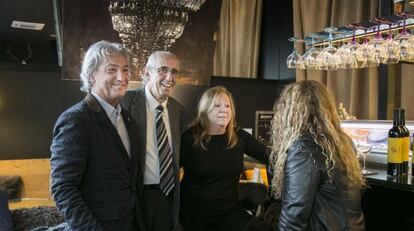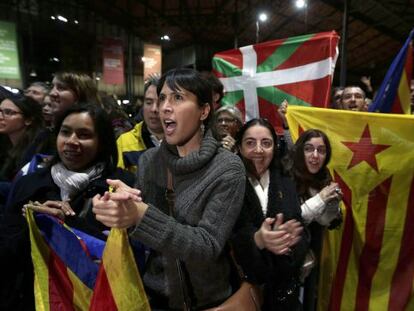Catalan vote: “It was like a soccer game with no referee”
Abstainers explain why they refused to cast their ballots in Sunday’s informal referendum

“Sovereignty lies with the people, and the people must be heard, but within a legal framework. Otherwise, it’s like playing a soccer game with no referee,” says Joan Bernaus, a middle-aged lawyer who refrained from voting in the informal referendum for self-rule held in Catalonia last Sunday.
According to the Catalan government, 2,305,290 people came out to cast their ballots, just over a third of eligible voters, which included residents of Catalonia aged over 16 and Catalans living abroad.
The central and Catalan government need to use common sense, and people need to know why they are voting yes or no”
EL PAÍS asked several people in Barcelona why they refused to participate in the straw vote, and the most recurring reasons were that the entire exercise was illegal, or else useless, or that it was a subterfuge to get people distracted from more serious issues affecting Catalonia such as corruption.
“There are more important things to do than this pantomime,” adds Bernaus. “You have to do things properly. The central government and the Catalan government need to use common sense, and people need to know why they are voting yes or no.”
The non-binding ballot — an attempt to hold an official referendum was struck down by the Constitutional Court after Madrid filed a legal challenge — has divided entire families.
Salvador and Marta Puig explain that two members of their family went to cast their vote, and two did not. Salvador did. Marta did not.
“Had I gone, I would have voted no to independence and yes to the other thing,” says Marta, in reference to the two questions asked of voters: “Do you want Catalonia to be a state?”; in the case of a positive response, voters were then asked: “Do you want Catalonia to be an independent state?”
Her friend Catalina did not go, either.
“I have no interest in being a secessionist,” she says. “Everyone has their own tastes. I am from Valencia but I’ve been living here since I was three years old, I married a Catalan man, my daughters are Catalan and Catalonia is my land, but...”
Why is Mas not also the leader of those who did not vote?” Antonio, economist
Renée, 77, is a Bulgarian woman who has been living in Spain for many years.
“I did not go vote because I’ve just had surgery and cannot walk, but if I could I would have voted no, a real big no, because I find all this useless,” she explains, sitting at a terrace café on Doctor Fleming street.
Paco, a 65-year-old who used to work in advertising, says he did not vote, either.
“It’s very simple: I didn’t vote because it was an illegal vote,” he says. “United we are better, and I think we stand a much better chance in the entire European and universal concert of nations.”
But if the vote had had legal backing, Paco would have been standing in line to cast his ballot.
The solution for Catalonia and Spain involves dialogue, and if necessary a legal and accepted referendum”
“The solution for Catalonia and Spain involves dialogue, and if necessary a legal and accepted referendum of the type they held in Quebec and Scotland,” he adds.
Antonio Sánchez, a 40-year-old from Granada who sells lottery tickets in Barcelona, did not vote “because certain political parties here called for civil disobedience. Who are you supposed to obey? Either the Popular Party (PP), which is in power [in Madrid] or them. And I voted for the PP because they are the lesser of two evils.”
Antonio, a 61-year-old economist, knows very well why he did not vote on Sunday.
“Because it was a joke, because it had no legal support, and because [regional premier Artur] Mas declared himself the leader of just some Catalans. He has made a great song and dance about this whole affair, but what he has really created is social fracture, and ultimately he is representing 25 percent of Catalans. So what about the other 75 percent? Why is Mas not also the leader of those who did not vote? I find it deplorable and sad. Very sad.”
Tu suscripción se está usando en otro dispositivo
¿Quieres añadir otro usuario a tu suscripción?
Si continúas leyendo en este dispositivo, no se podrá leer en el otro.
FlechaTu suscripción se está usando en otro dispositivo y solo puedes acceder a EL PAÍS desde un dispositivo a la vez.
Si quieres compartir tu cuenta, cambia tu suscripción a la modalidad Premium, así podrás añadir otro usuario. Cada uno accederá con su propia cuenta de email, lo que os permitirá personalizar vuestra experiencia en EL PAÍS.
En el caso de no saber quién está usando tu cuenta, te recomendamos cambiar tu contraseña aquí.
Si decides continuar compartiendo tu cuenta, este mensaje se mostrará en tu dispositivo y en el de la otra persona que está usando tu cuenta de forma indefinida, afectando a tu experiencia de lectura. Puedes consultar aquí los términos y condiciones de la suscripción digital.
More information








































